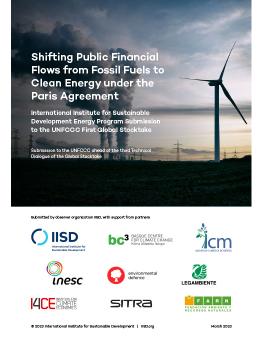
Shifting Public Financial Flows From Fossil Fuels to Clean Energy Under the Paris Agreement
International Institute for Sustainable Development Energy Program Submission to the UNFCCC First Global Stocktake
The first UNFCCC Global Stocktake process-which will conclude at COP28 in Dubai-intends to evaluate progress towards achieving the goals of the Paris Agreement and increase national ambitions to speed up climate action. This report is the IISD Energy Program's submission to the first Global Stocktake, assessing global progress made on shifting public finance flows from fossil fuels toward clean energy. It finds that despite the countries' pledges, fossil fuel subsidies have continued to rise since 2015—exceeding USD 1 trillion for the first time in 2022—and provides recommendations to help overcome challenges to shifting public financial flows towards clean energy.
This submission to the first formal United Nations Framework Convention on Climate Change Global Stocktake provides evidence of the extent to which parties have made progress on aligning public financial flows—including subsidies, investments by state-owned enterprises (SOEs), and lending from public financial institutions—with the need to reduce emissions in line with climate targets.
Commitments on shifting financial flows have not fared well during the COVID-19 and energy crises. According to the Fossil Fuel Subsidy Tracker, fossil energy subsidies reached USD 732 billion in 2021, 35% higher than in 2015, the year of the Paris Agreement (USD 543 billion). They further jumped to USD 1.1 trillion in 2022, according to the International Energy Agency's preliminary estimate that does not cover all countries and includes only consumer subsidies, so the final value of fossil fuel subsidies for 2022 will be even higher.
Yet, fossil fuel subsidies hinder the implementation of the Paris Agreement because they create incentives to produce and consume more fossil fuels, increasing greenhouse gas emissions. They also they skew the level playing field for investing in and deploying clean energy technologies. It is sometimes claimed that they are needed to support low-income households—while research shows that the biggest benefits often accrue to the wealthiest groups.
These subsidies are also often extremely costly, consuming public resources that could instead be used to support the poor more efficiently (such as health and education services) or to address climate change mitigation and adaptation.
Shifting public support away from fossil fuels can be a source of positive social and environmental changes, but in many cases, it needs to be carefully planned or it can have negative socioeconomic impacts.
The following steps can help overcome challenges to shifting public financial flows towards clean energy:
- Improving the state of transparency.
- Improving the accountability of global commitments on shifting public support from fossil fuels to clean energy.
- At the national level, good planning is essential: getting the prices right, managing impacts, and building support.
You might also be interested in
March 2025 | Carbon Minefields Oil and Gas Exploration Monitor
Last month, a total of 22 oil and gas exploration licences were awarded across six countries, with an estimated volume of discovered resources of 45.4 million barrels of oil and 10.4 billion cubic feet of gas.
Getting Where We Need to Go: Net-zero transport in Canada
This brief explains how a clean passenger transport system based on walking, cycling, public transit and electric vehicles can reduce costs for households and reliably meet Canadians' transportation needs while making cities cleaner, quieter, and safer.
February 2025 | Carbon Minefields Oil and Gas Exploration Monitor
In January 2025, 77 oil and gas exploration licences were awarded in seven different countries, with Norway leading in terms of embodied emissions.
State of the Sector: Critical energy transition minerals for India
This report presents a comprehensive strategy for securing a reliable supply of critical energy transition materials (CETMs) essential to India's clean energy and low-carbon technology initiatives.